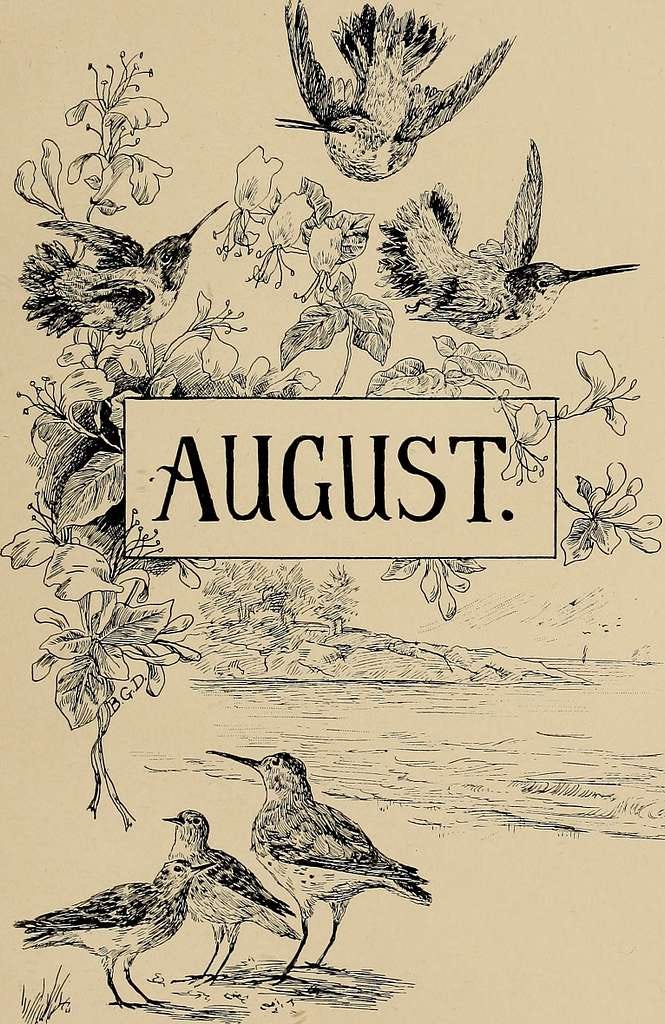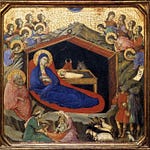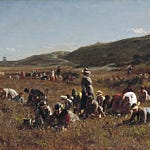In celebration of the two-year anniversary of Word & Song, we are offering a special rate on paid, gift, and upgraded subscriptions through July.
August, our Word of the Week, is the month of the “dog days,” a time when things get especially hot in catch-basins of humidity like Rome or St. Louis. Why August and not July? I think it’s because it takes most of the summer for the Mediterranean Sea to reach its peak temperature. I once tried to swim off the coast of southern Italy (Catanzaro Lido) in early June, and it felt so cold it hurt. August is in fact the hottest month in Rome, which, by the way, is only as far south as New York City. “Our Sea” is what the ancient Romans called the Mediterranean, once they had taken over pretty much all of the land that bordered upon it. It’s that vast almost-inland body of water that gives southern Europe so beautiful and healthy a climate — though, as I say, it does get hot in the dumps of low-lying Rome when the dog days come around.
And how long have people called them the “dog days”? Only about two thousand years or so. It’s because the Dog Star, Sirius — the brightest star in the northern sky, in the constellation of the Big Dog (Canis Major), is pretty much in line with the sun during that part of the year. Plutarch called them “dog days,” in Greek of course, and the Romans called them “dog days,” in Latin of course, and then people in English picked up the habit in Shakespeare’s time. When I think of the phrase, I don’t have in mind that star in the sky, which after all isn’t to be seen at all if it’s marching with the sun, but of a dog lying on a cool floor, taking it easy on a hot summer afternoon.
Well then, what about August? It comes from the same place where we get July: from fawning on a Roman boss-man. July was renamed by the Roman senate for Julius Caesar, after his assassination in 44 B.C. Otherwise we’d be calling it “Quintle” or “Quentil” or “Quentin” or something like that, because it had been Quintilis, meaning the fifth month. The year, you see, began in March, and that’s why the name of ninth month, September, means “seventh month,” and so forth through the rest of the “embers” and the “ober.” After the death of Julius Caesar, the more idealistic of the assassins thought they were going to reinstitute a vigorously republican form of government, but for various reasons, political, economic, and cultural, reasons which I won’t get into here, that was just a pipe dream. You can’t have a republic made up of people who lack the old republican virtues. In any case, after some years of jockeying, collusion, political assassination, and open war, the boss-man who emerged as the head of state was Caesar’s great-nephew and adopted son, Octavian. He — or rather his admiral, Agrippa — defeated Marc Antony, Octavian’s most powerful and dangerous rival, in the sea battle of Actium, in 31 B.C. Octavian then cleaned up the rest of Antony’s allies, and when peace was established, he gave authority back to the Senate, in 27 B.C. Well, he pretended to, anyway. He called himself by the new title, Princeps, meaning “First Head” or “First Citizen,” the source of our word prince. “See,” we can hear him saying, “I’m just like everybody else!” The Senate itself knew better. They bestowed upon him the title Augustus, and that’s what historians have called him ever since. And they renamed the month coming after July, so we have uncle and nephew back to back, or Dad and Chip off the old Adopted-in-Last-Will-and-Testament Block. I don’t mean disrespect to Augustus Caesar. He was cold, ruthless, ambitious, intelligent, capable, scrupulous in the administration of law when it did not concern his own person, and one of the most successful rulers in the history of the world.
The title Augustus meant, to the Roman ear, something like Your Grand High Mystic Awesomeness. There’s some dispute over exactly where the word comes from, though the main candidates are close in meaning anyway. According to one guess, you are augustus if you have the auguries on your side: all the right omens. And what makes somebody an augur? It has to do either with predicting increase, or with listening to birds cooing — the idea being that if you want a message from heaven, the birds are the signs to look for. Hence you have an auspicious future if the birds — the aues — are looking good: the auspex is literally the soothsayer who has his specs out for the birds. According to the other guess, you are augustus if you yourself give increase. In this case, the birds are out, and augmenting is in, directly intended: Latin augeo, I increase.
That’s not the end of our foray into August, though. The ancient root that gave the Latins their aug- gave our ancient Anglo-Saxon forebears their -eac, for example in the verb eacian, meaning to increase. That verb survives in English in one fossilized phrase, which my beloved Saint Louis Cardinals happened to give a good instance of today. They went into the bottom of the ninth inning tied 3-3, when Paul Goldschmidt led off with a home run to left field, so that they could eke out a 4-3 victory. I’ve known about eking out ever since I was a boy reading the sports pages. It means that you just barely manage to increase your runs better than the other team does. As for the adverb eac, meaning also — still present in early modern English as eke — it survives in a place where you’d not expect it. Suppose you’re born with the name Octavian, and your Senate decides you ought to have another name, an also-name, such as Augustus. Well, in the old days in English that was an eke-name, and after the wonders of what linguists call “faulty separation,” an eke-name became a neke-name: a nickname. So then, August and nickname would be cousins! They sure don’t look alike, but blood is blood.
Word & Song by Anthony Esolen is an online magazine devoted to reclaiming the good, the beautiful, and the true. We publish six essays each week, on words, classic hymns, poems, films, and popular songs, as well a weekly podcast for paid subscribers, alternately Poetry Aloud or Anthony Esolen Speaks. Paid subscribers also receive audio-enhanced posts and on-demand access to our full archive, and may add their comments to our posts and discussions. To support this project, please join us as a free or paid subscriber. We value all of our subscribers, and we thank you for reading Word and Song!














